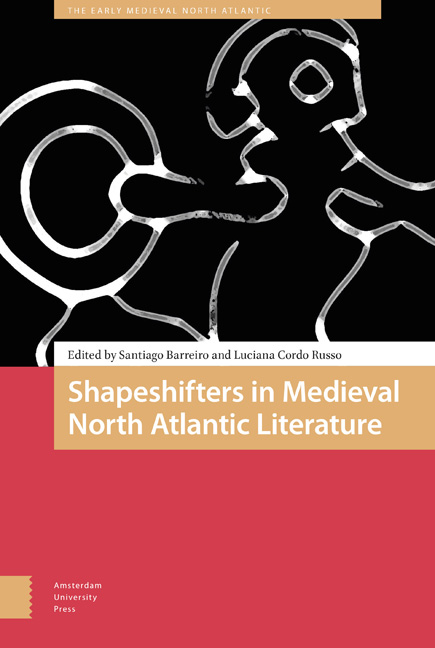Book contents
- Frontmatter
- Contents
- Acknowledgments
- Introduction: Medieval Thought and Shapeshifting
- 1 Wundor wearð on wege‘a wonder happened on the way’: Shifting shapes and meanings in Old English Riddles
- 2 The Big Black Cats of Vatnsdalr and Other Trolls: Talking about shapeshifting in medieval Iceland
- 3 The Hoard Makes the Dragon: Fáfnir as a Shapeshifter
- 4 Eigi í mannligu eðli: Shape, Monstrosity and Berserkism in the Íslendingasögur
- 5 The Cursed and the Committed: A Study in Literary Representations of ‘Involuntary’ Shapeshifting in Early Medieval Irish and Old Norse Narrative Traditions
- 6 Unde sunt aues istae?: Notes on Bird-Shapeshifting, Bird Messengers, and Early Medieval Hagiography
- 7 Sin, Punishment, and Magic: Changing Form in Medieval Welsh Literature
- Index
7 - Sin, Punishment, and Magic: Changing Form in Medieval Welsh Literature
Published online by Cambridge University Press: 16 February 2021
- Frontmatter
- Contents
- Acknowledgments
- Introduction: Medieval Thought and Shapeshifting
- 1 Wundor wearð on wege‘a wonder happened on the way’: Shifting shapes and meanings in Old English Riddles
- 2 The Big Black Cats of Vatnsdalr and Other Trolls: Talking about shapeshifting in medieval Iceland
- 3 The Hoard Makes the Dragon: Fáfnir as a Shapeshifter
- 4 Eigi í mannligu eðli: Shape, Monstrosity and Berserkism in the Íslendingasögur
- 5 The Cursed and the Committed: A Study in Literary Representations of ‘Involuntary’ Shapeshifting in Early Medieval Irish and Old Norse Narrative Traditions
- 6 Unde sunt aues istae?: Notes on Bird-Shapeshifting, Bird Messengers, and Early Medieval Hagiography
- 7 Sin, Punishment, and Magic: Changing Form in Medieval Welsh Literature
- Index
Summary
Abstract
Although shapeshifting is a recurring phenomenon in medieval Welsh literature, it has not been systematically addressed. This paper thus surveys metamorphoses in secular and religious prose tales written in Wales, both in Middle Welsh and Latin: on the one hand, it examines and classifies instances of shapeshifting in the collection of tales known as Mabinogion and, on the other hand, it looks at a few cases in the hagiographical discourse (Latin lives and vernacular poetry) that narrate metamorphoses as miracles. By analysing the vocabulary, the narrative function and meaning of transformations, the association of metamorphoses with magic, the marvelous and the miraculous emerges, as well as ways of thinking about change and identity, and the boundaries between human and animal realms, and between the natural and the supernatural.
Keywords: Shapeshifting, Punitive Transformations, Wales, Mabinogion, Transformation Miracles
In her introduction to the most recent translation of the eleven Middle Welsh prose tales, known as Mabinogion, Sioned Davies summarises their main themes by pointing out that ‘[t]hey tell of love and betrayal, shape-shifting and enchantment, conflict and retribution.’ Indeed, shapeshifting is a recurring phenomenon in these stories: in six of the eleven tales we find a total of 23 transformations of different types. These metamorphoses tell us, as Caroline Walker Bynum, Marina Warner, and Laurence Harf-Lancer have taught, about ways of thinking about change and identity, and the boundaries between human and animal realms, and between the natural and the supernatural. However, they have not yet been systematically addressed. The following pages will survey metamorphoses in secular and religious prose tales written in Wales, both in Middle Welsh and Latin, paying particular attention to vocabulary, with the aim of discussing their narrative function and meanings. In section one I will examine instances of shapeshifting found in a group of Middle Welsh tales, which are associated with magic and the marvellous. In addition, a few cases of transformations are narrated in hagiographical texts as supernatural miracles performed by or for saints; they will be discussed in section two. This comparison is especially elicited due to the interplay of Latin and vernacular writing, as well as of religious and secular texts, and the particular character of the lives of Welsh saints.
- Type
- Chapter
- Information
- Shapeshifters in Medieval North Atlantic Literature , pp. 155 - 184Publisher: Amsterdam University PressPrint publication year: 2018



